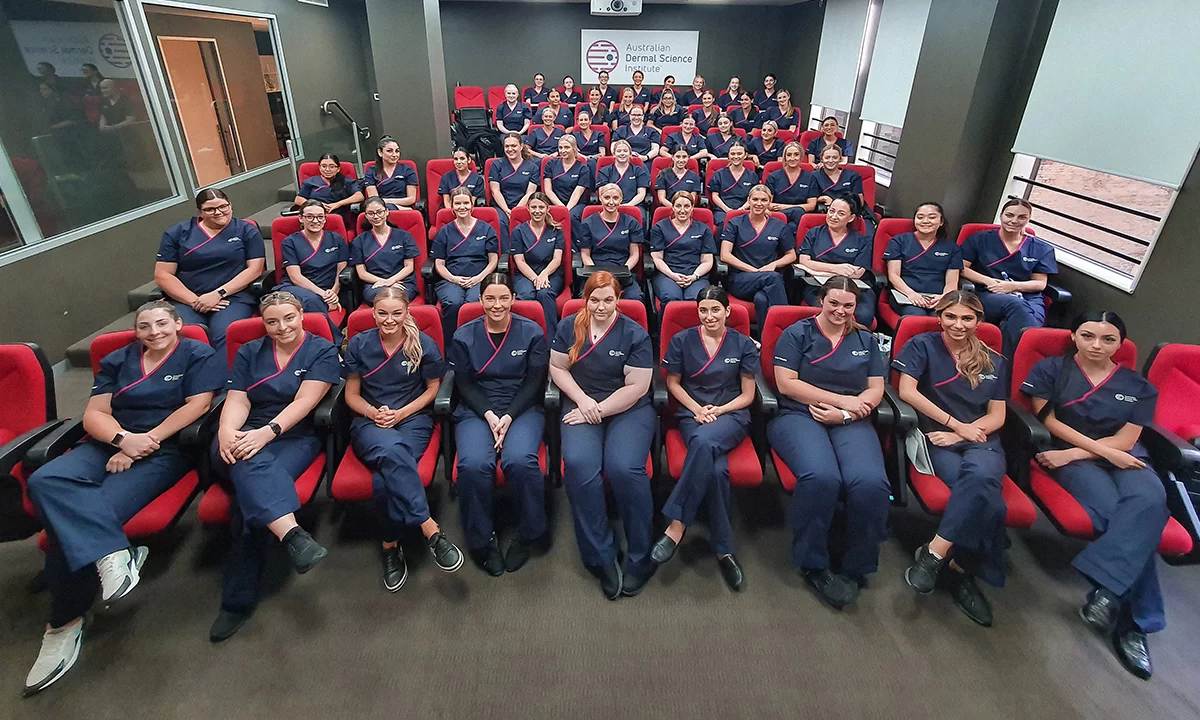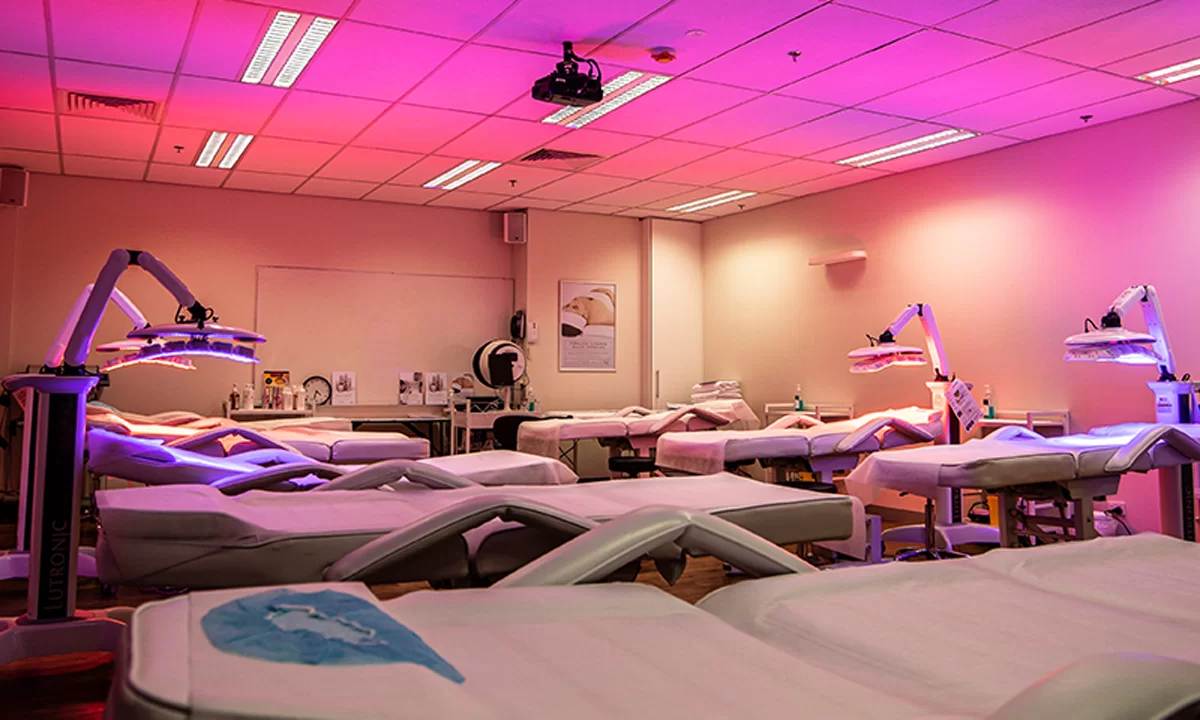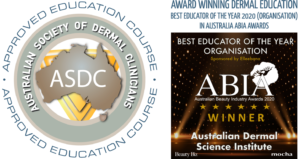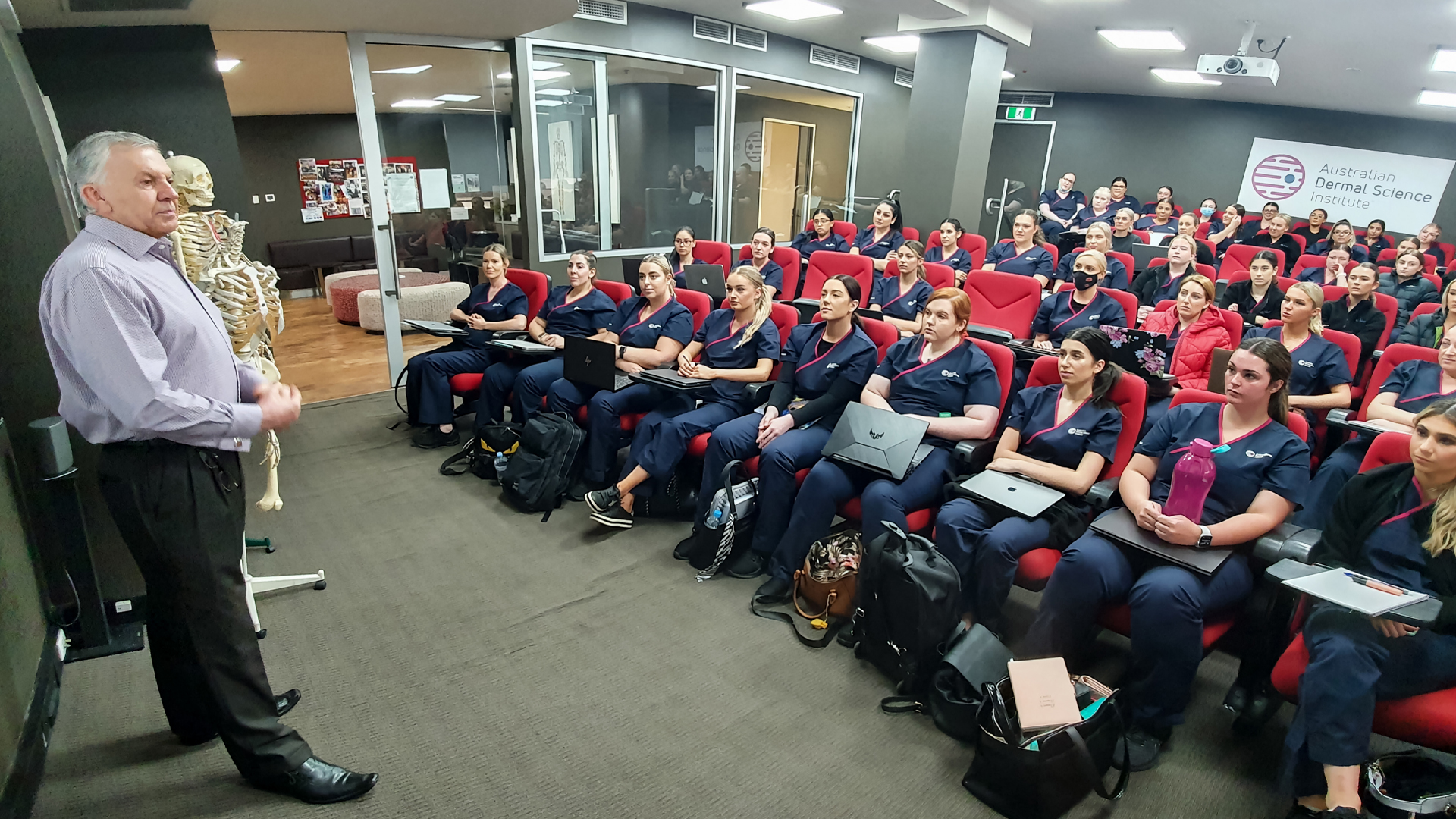Associate Degree in Applied Health Science
(Dermal Therapy)
About this Qualification
The Associate Degree in Applied Health Science (Dermal Therapy) is one of the highest qualifications in Higher Education available in Australia to identify you as an expert in the rapidly changing area of Dermal Therapy. This qualification will help you accelerate your career by giving you a solid foundation in Dermal Therapy and is also your first step towards a Bachelor of Applied Health Science (Clinical Aesthetics).
Course Overview
Course Duration: |
2 years full-time |
Course Delivery: |
Face to face theory lectures and practical classes |
Total Subjects: |
16 subjects (worth 10 credit points each) |
Payment options: |
FEE-HELP and Upfront |
COURSE DURATION
COURSE DELIVERY
TOTAL SUBLECTS
PAYMENT OPTIONS
FEE – Help & upfront.

Recognised and Respected
You’ll love learning in our Melbourne campus which features a unique purpose built facility featuring an extensive array of Laser and IPL equipment and the latest medical grade devices as utilised in industry.
Our Clinical supervisors also practice in industry as Dermal Clinicians alongside leading Plastic Surgeons, Dermatologists and Cosmetic Doctors ensuring that you are guided by experts with up to date the skills and knowledge of current practice.
The Degree courses offered by the Australian Dermal Science Institute have been endorsed by the peak industry body – The Australian Society of Dermal Clinicians and recognised as Undergraduate Education Programs leading to admission as Full Membership of ASDC for Bachelor Degree Graduates and Associate Membership of ASDC for Associate Degree Graduates.
Acknowledged by the leaders in our industry – our Institute was awarded Best Educator of the Year – Organisation by the Australian Beauty Industry Awards (ABIA).
This Degree is delivered under a Third Party arrangement with the Australasian College of Health & Wellness; an Institute of Higher Education.

Achieve up to 3 qualifications in 4 years.
The new way to achieve a Dermal Science Degree has arrived. Via our innovative pathway with elly lukas College, Students can achieve 3 sought after qualifications in 4 years and start working in the industry gaining invaluable experience after the 1st year.
After completion of the Diploma of Beauty Therapy in the first year, you’ll be a fully qualified Beauty Therapist with specialised facial skills and underpinning science knowledge that will assist your transition to Degree studies.
Year 1 – Diploma of Beauty Therapy = Beauty Therapist
Year 2 & 3 – Associate Degree in Applied Health Science (Dermal Therapy) = Dermal Therapist
Year 4 – Bachelor of Applied Health Science (Clinical Aesthetics) = Dermal Clinician


Achievable and Accessible
Our combination of theoretical learning through our face to face lectures and clinical workshops that provide hands on practical experience with real clients ensures you can balance your study with the rest of your life.
The majority of our Students are successfully working in the Beauty/Spa/Laser industry as they are already qualified Beauty Therapists having completed the 1 year Diploma of Beauty Therapy at elly lukas.
The course is designed around the fact that working in industry is important to our Students which is why lectures & clinical practice are timetabled on fixed days to provide certainty for our Students to obtain regular employment shifts.
Your study will be supported by a dedicated Academic Learning Advisor who can assist you with your academic skills, coordinate your study, provide industry advice, and do everything they can to make sure you get the most from your study.
Our regular guest lecturer program welcomes eminent academics and industry leaders to provide invaluable insight and understanding of key topics.

Recognised and Respected
You’ll love learning in our Melbourne campus which features a unique purpose built facility featuring an extensive array of Laser and IPL equipment and the latest medical grade devices as utilised in industry.
Our Clinical supervisors also practice in industry as Dermal Clinicians alongside leading Plastic Surgeons, Dermatologists and Cosmetic Doctors ensuring that you are guided by experts with up to date the skills and knowledge of current practice.
The Degree courses offered by the Australian Dermal Science Institute have been endorsed by the peak industry body – The Australian Society of Dermal Clinicians and recognised as Undergraduate Education Programs leading to admission as Full Membership of ASDC for Bachelor Degree Graduates and Associate Membership of ASDC for Associate Degree Graduates.
Acknowledged by the leaders in our industry – our Institute was awarded Best Educator of the Year – Organisation by the Australian Beauty Industry Awards (ABIA).
This Degree is delivered under a Third Party arrangement with the Australasian College of Health & Wellness; an Institute of Higher Education.

Achieve up to 3 qualifications in 4 years.
The new way to achieve a Dermal Science Degree has arrived. Via our innovative pathway with elly lukas College, Students can achieve 3 sought after qualifications in 4 years and start working in the industry gaining invaluable experience after the 1st year.
After completion of the Diploma of Beauty Therapy in the first year, you’ll be a fully qualified Beauty Therapist with specialised facial skills and underpinning science knowledge that will assist your transition to Degree studies.
Year 1 – Diploma of Beauty Therapy = Beauty Therapist
Year 2 & 3 – Associate Degree in Applied Health Science (Dermal Therapy) = Dermal Therapist
Year 4 – Bachelor of Applied Health Science (Clinical Aesthetics) = Dermal Clinician


Achievable and Accessible
Our combination of theoretical learning through our face to face lectures and clinical workshops that provide hands on practical experience with real clients ensures you can balance your study with the rest of your life.
The majority of our Students are successfully working in the Beauty/Spa/Laser industry as they are already qualified Beauty Therapists having completed the 1 year Diploma of Beauty Therapy at elly lukas.
The course is designed around the fact that working in industry is important to our Students which is why lectures & clinical practice are timetabled on fixed days to provide certainty for our Students to obtain regular employment shifts.
Your study will be supported by a dedicated Academic Learning Advisor who can assist you with your academic skills, coordinate your study, provide industry advice, and do everything they can to make sure you get the most from your study.
Our regular guest lecturer program welcomes eminent academics and industry leaders to provide invaluable insight and understanding of key topics.
Admission Requirements
To satisfy the ADSI academic admissions requirements for the Associate Degree in Applied Health Science (Dermal Therapy), applicants must:
1. Meet one of the following entry requirements:
a. Successful completion of the Diploma of Beauty Therapy course at Elly Lukas Beauty Therapy College ; or
b. Successful completion of a Bachelor of Nursing Degree at an Australian University or Higher Education Provider and successful completion of the following units at Elly Lukas Beauty Therapy College:
- SHBBFAS005 Provide facial treatments and skin care recommendations OR SHBBFAS002 Provide facial treatments and skin care recommendations
- SHBBFAS006 Provide specialised facial treatments OR SHBBFAS003 Provide specialised facial treatments
- SHBBSKS009 Provide micro-dermabrasion treatments OR SHBBKS005 Provide micro-dermabrasion treatments
- SHBBINF002 Maintain infection control standards OR HLTINF005 Maintain infection prevention for skin penetration treatments
- SHBBSSC001 Incorporate knowledge of skin structure and functions into beauty therapy
- SHBBSSC002 Incorporate knowledge of body structures and functions into beauty therapy
Applicants who have not yet completed the Diploma of Beauty Therapy course (or required units for Bachelor of Nursing Graduates) should contact Elly Lukas Beauty Therapy College for further details.
2. And must meet all below requirements:
c. participate in an interview (if required);
d. be at least 18 years of age; and
e. sit an admission test (if required).
This course is delivered with face-to-face lectures and hands on practical clinic delivery in our Queen Street Melbourne Campus. Online/distance delivery is not available.
Career Outcomes
Completing the Associate Degree in Applied Health Science (Dermal Therapy) will prepare you for work in such areas as:
- Cosmetic Medical and Surgery Clinics
- Medispas
- Laser and Skin Clinics
- Health, Wellness, and Ageing Clinics
- Dermatology Clinics
- Plastic Surgery Clinics
- Aesthetics Industry Education
- Cosmetic Research and Development
- Own Dermal Therapy practice
- Pathway to the Bachelor of Applied Health Science (Clinical Aesthetics)
Course Content
This course includes 4 streams:
- Human Biosciences,
- Applied Health Science,
- Health Communication and Management,
- Clinical Aesthetics Practice
Units in the 1st year
AHS101: Integumentary SystemThis subject introduces students to the complexity of the ‘integumentary system’, the skin and related appendages including nails, hair, glands, and proteins and the variety of mechanical, thermal and environmental impacts that affect the ageing process and general health and functioning of the skin. |
AHS102: Introduction to Applied Health ScienceIn this subject student explore the history of health care provision and contextualise it applicable to clinical aesthetics, within the contemporary health care system. Students will study the wide variety of disciplines within modern health care provision and the treatments and technologies used in providing a health care experience for clients, looking into the evolution of health care and the commercial environment of health promotion. |
HBS101: Human Structure and Function 1This subject introduces students to the wonders of the structure and function of the human body, including an overall introduction of the major body systems, the fundamentals of biochemistry that govern how body components, the structure and function of the communication systems such as the nervous system, the musculoskeletal system, endocrine system and the immune system, and an overview of the reproductive system. |
HBS102: Human Structure and Function 2This subject considers the maintenance of body homeostasis through an investigation of the cardiovascular, respiratory and renal systems. An investigation into the electrical and mechanical functions of the heart, its interaction with the blood vessels, the hormones and the autonomic nervous system that control heart function. Also explored is the role of the renal system in the control of the chemical composition of the body, water balance and body fluid volume, and an overview of the respiratory and gastrointestinal system control of homeostasis. |
HCM101: Introduction to Professional PracticeThe subject is focuses on the socio-cultural, legal and ethical implications of professional therapeutic practice in the aesthetics industry. This subject introduces students to different practice modalities prior to tackling issues of sustainability, reflectiveness and ethics in practice, and also covers the theoretical and philosophical foundations influencing the decision-making processes of the aesthetic practitioner. |
HCM102: Professional CommunicationsThe subject is designed to equip students with the oral and written communication skills they require to operate effectively in the workplace and to interact with a diverse clientele and professional medical network. This is achieved through an exploration of both the theoretical and practical dimensions of modern communications, with an emphasis on developing the skills needed to deal with a wide variety of different clinical communications environments. |
CAP101: Introduction to Clinical PracticeThis is an introductory subject providing students with opportunities to participate in a learning environment that delivers both a theoretical understanding and practical application of the consultation process utilising both aesthetic and medical classifications and analysis in forming a comprehensive consultation. This subject explores therapeutic communication styles in gaining client history and appropriate record keeping within a practice, and the fundamentals of professional skin care as a base for further clinical aesthetic practices. |
CAP102: Dermal Therapy 1This subject provides an opportunity for students to participate in a clinical learning environment that seeks to provide both theoretical understanding and practical application of chemical peeling, microdermabrasion and LASER/IPL. Students will develop critical thinking from evidence based knowledge in reviewing patient history and presentation and formulation of appropriate chemical peeling and/or microdermabrasion treatments for predictable outcomes in clinical practice. Additionally, students will be exposed to the safe operating process in the use of laser equipment. |
Units in the 2nd year
AHS201: Nutrition in PracticeIn this subject, students explore the importance of correct dietary intake in order to maintain a healthy skin and body. Students will focus on how bodily functions are directly related to biochemical interactions and nutrition. In addition, this subject will cover nutritional requirements of the body, nutritional make-up of the modern diet/foods and clinical manifestations of nutritional deficiencies. |
AHS202: Cosmetic ChemistryThis subject considers the theories and practices associated with the cosmetic ingredients used in aesthetic practice via the scientific field of cosmetic chemistry, while contrasting this against the marketing ‘hype’ and language often used to promote cosmetic and related products and services. Students will be exposed to the classifications of raw state ingredients and their use in finished products. |
HCM201: Critical Thinking and Research SkillsThis subject introduces students to the theories and practices associated with critical thinking and scientific research. It describes the principles of what is known as ‘evidence-based practice’ and explores the research process before looking at some of the ethical and political aspects of research. The subject examines in detail key research paradigms including the two principle approaches to research: quantitative and qualitative research, and introduces students to the key tools and techniques used in data collection and analysis including sampling, surveys, interviews, case studies, observation, experiments, and content analysis. |
HCM202 Practice ManagementThis subject introduces students to the field of entrepreneurship, innovation, practice management and how associated theories, processes and practices can be applied to the allied health sector. This subject will explore entrepreneurial ways of thinking and how to innovatively and creativity overcome obstacles, the qualities and characteristics of well-known and successful entrepreneurs, and the methods by which new ventures can be created. |
HBS201: Differential Diagnosis of Skin DisordersThis subject examines in detail the diagnosis, prognosis and treatment protocols of dermatological conditions following inflammatory processes. Students are introduced to the fundamentals of infection and pathology prior to studying some of the more common dermatological conditions and diseases such as acne, eczema and psoriasis to name a few. |
HBS202: PathophysiologyThis subject builds on the knowledge gained in Human Structure and Function subjects and advances the student’s understandings of the impact of disease and the ways alterations in homeostatic mechanisms disrupt the normative functioning of the human body. The subject concentrates on central concepts of patho-physiology such as how cells and tissues respond to pathogenic challenges, the principles behind genetic disorders and alterations in immunity and inflammation and how these affect the various systems in the body. |
CAP201: Dermal Therapy 2This subject provides an ongoing opportunity for students to participate in a clinical learning environment that seeks to provide both theoretical understanding and practical application of the light therapies used in a clinical aesthetic practice. Students will learn the appropriate and safe use of Light Emitting Diodes (LED) and Intense Pulsed Light (IPL), and their application in pigmentation, vascular and rejuvenation treatments. |
CAP202: Advanced Dermal InterventionsThis subject provides an opportunity for students to participate in a clinical learning environment that seeks to provide both theoretical understanding and practical application of RF, operation of LASER equipment and micro-needling, cosmetic tattooing, tattoo removal, fractional and ablative LASER treatments, body cavitation, High Intensity Focused Ultrasound (HIFU), plasma and integrative therapies. Students will develop critical thinking from evidence based knowledge in reviewing patient history and presentation and delivery of appropriate treatment protocols for predictable outcomes in clinical practice. |
*hide me*
Dermal Science
Institute
